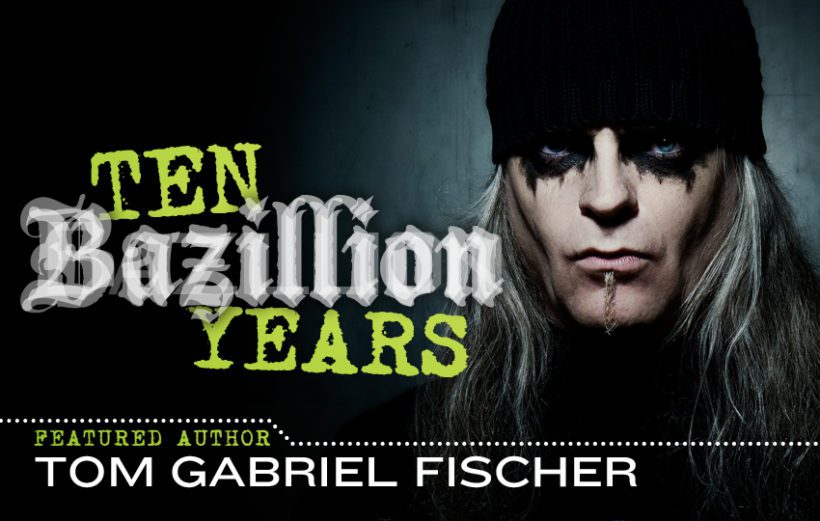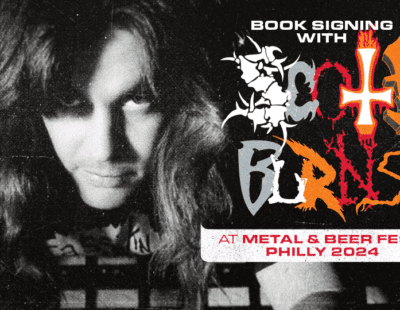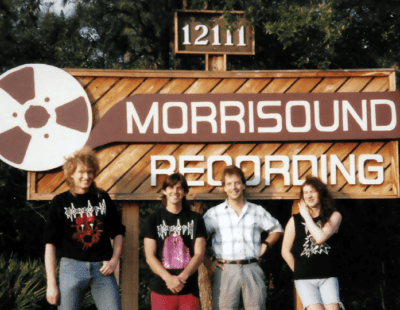
Tom Gabriel Fischer was no stranger to the ordeal of writing a book. His first memoir Are You Morbid?, published in 2000, exposed the many hardships Celtic Frost experienced on their path to metal legend. His second book needed a special touch: Only Death is Real was an archival record of Fischer’s experiences with early extreme metal band Hellhammer complete with striking black and white photos. While other publishers came calling, it quickly became clear that Bazillion Points was the right fit. The three-time Hall Of Famer talked to us about his memories of writing Only Death Is Real and his plans for reissuing an expanded version of Are You Morbid with Bazillion. Fischer and Triptykon will perform a set of Celtic Frost material at the Decibel Beer and Metal Fest in Los Angeles next month.
How did you first connect with Ian and Bazillion Points?
I can’t remember exactly when Ian and I first got to know each other. At any rate, I initially worked with him due to his activities as a journalist and author. One of the most memorable interviews Martin Eric Ain and I did after the Celtic Frost reunion, for example, was with Ian in New York, in February of 2006.
Did you consider any other publishing houses? Why did you decide to go with Bazillion?
Upon completion of the manuscript, I was in touch with a number of publishers. Adam Parfrey’s Feral House Publishing expressed their desire to publish the book, and we began serious contract negotiations. I had a very clear and detailed vision of what I wanted to book to look like and what the photo content was to be. I have been part of the music industry long enough to know what a publication with my name on it needed to be like and how to get there.
As we were negotiating, however, Parfrey told me that he thought the book was too voluminous and that we needed to shed a substantial number of pages and photos. I thus terminated the negotiations and withdrew the manuscript. Shortly thereafter, Ian and Bazillion Points entered the picture. Without knowing what had taken place, Ian suggested that we actually add content to the book and make it more substantial. I knew immediately that he was the publisher I was looking for.
You’d already ventured into publishing with Are You Morbid? When did you decide to write Only Death Is Real?
When Martin and I were working on the reformed Celtic Frost’s Monotheist album, around 2004 or 2005. We discovered that nearly all the information we found online about Hellhammer was riddled with mistakes, often substantial ones, and even on dedicated fan pages. I first intended to simply write a correct, brief biography for online use. But the text became ever longer as I began seriously researching and recovering notes, documents, flyers, and photos from our archives. I intended to give it to the former members of Hellhammer, as a memento. But eventually, after five years of research and work, I had gathered enough material and text for a coffee table book, and Martin agreed that I should publish it in earnest.
What was it like to collect all of the memories of that time of your life, which you have admitted was fraught with difficulty?
We all had our problems with Hellhammer in one way or another at some time and for our individual reasons. But the work on the initial Celtic Frost reissues in the late 1990s, as well as my renewed collaboration with Martin, helped me to come to terms with my own ghosts. My original hesitance regarding Hellhammer was rooted in that band’s direct connection to the very challenging youth I experienced, and to a couple of the lyrics we had written. Once I was able to look at the band solely as a musical project, however, things became much easier for me. I think it was much the same for Martin and Steve Warrior.
Did you have a set writing process?
Nothing special. Just discipline, enthusiasm, and the quest for as much historical accuracy as possible.
Did Ian offer any editorial suggestions or did he give you free rein with the material? Or was it a bit of both?
There were a lot of constructive discussions, and also a number of rather terse ones. Ian first had to get used to my demand for full control, down to the design and layout of the book. He told me that this was utterly unusual for an author-publisher relationship. I understood, of course, but “unusual” is what I have built my career on.
What was it like when you finally held a copy of the book in your hands?
Well, it wasn’t the first time that I held a finished product in my hand that had taken years of work to create. Nonetheless, this was truly special. I personally think it is a far better book than my first one, and it was also an important publication in that it closed a circle and gave Hellhammer, a band completely in the underground and almost universally ridiculed during its existence, a worthy platform.
The critical reception to ODIR was enormously positive but what did you hear from everyday readers? Have there been people who have approached you to talk about the book much like they do with questions about music?
I was extremely fortunate in that the reactions I have received by readers have been equally positive, to this day. There are many members of our audience who talk about the book with me or who are bringing it to autograph sessions, in spite of the fact that it is physically cumbersome and heavy.
Have there been any thoughts of reissuing Are You Morbid? with Bazillion and expanding it so it is on par with ODIR?
Absolutely; exactly that. I am working on it, and I am scheduled to submit the manuscript and associated material in 2019.
We just experienced the one year anniversary of Martin’s passing and he participated in the book. What did he think of the final product?
He loved it. After reading it, he wrote me a card that said “it is wonderful,” and he mentioned the book often. He was not directly involved in the writing, but he was my closest advisor on every level when I began the work on the book. This is why I gave him a co-author credit.
I imagine it is bittersweet seeing many of these images with Martin gone now.
Yes, it is. Very much so. And then there are also uncounted Celtic Frost images and stories that have the very same effect on me. Not least the ones I am being exposed to as I am working on the new book.
What makes Bazillion Points a special publisher?
Ian’s ability to truly understand an author and their story, at least in my case. Ian is a person with a very wide horizon and a truly deep and international intellect. He is not detached or uninterested like so many in the industry, and he did not shy away from taking a risk and giving me full control.
What is your favorite Bazillion Points book and why?
That’s difficult to choose because there are a number of very good ones. But perhaps Murder In The Front Row, as it directly connects to my own musical life and taste at that time.
Is there a book you would like to see Bazillion publish?
Oh, I have submitted a list of ideas to Ian, some of them slightly unusual, and perhaps one or the other will see the light of the day eventually.





